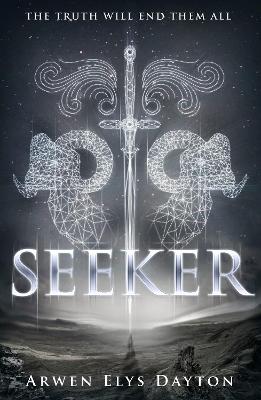Reviewed by Briana @ Pages Unbound on
Source Netgalley
I have mixed feelings about Seeker. On one hand, the book is ambitious, well-written, and imaginative. It is a young adult fantasy novel that has a rare amount of world-building and an unusual amount of diversity. On the other hand, the novel gets so caught up in its own world-building, in its own show and its own message that “TONS OF THINGS ARE AT STAKE AND THERE ARE MORAL QUESTIONS,” that it never adequately deals with any of the moral questions it purports to be raising. In a sense, this is a book that is well-constructed but is too often about nothing interesting at all.
The novel opens strongly. There is action and a bit of mystery, as the three protagonists John, Quin, and Shinobu are engaged in a deadly training battle, right before they will go “THERE” and take their oaths to become Seekers. Their training grounds in Scotland are strangely medieval, but readers eventually get hints that Seeker takes place in a futuristic world. The first transition between these two distinct settings is admittedly clunky, but as the book progresses the two atmospheres blend, and it becomes apparent that Dayton put a lot of thought into constructing her world.
She also clearly put some thought into creating the magic. Some things remain unclear and frustrating, however. For instance, “THERE” is never referred to as anything else, which is ridiculous. Yes, in public the Seekers might wish to be somewhat circumspect while talking about their magical abilities, but as they never refer to “THERE” as something more specific even among themselves, the impression the reader is left with is that the Seekers do not actually understand where or what “THERE” is at all, even though they ostensibly have hundreds of years of Seeker lore and history in which they could have theorized about this. The contrast between this complex history, which Dayton seems to have richly imagined, and the Seekers’ refusal to acknowledge to utilize or acknowledge it, makes the Seekers as whole seem childish rather than stern and magical.
On an individual level, most of the characters are also annoying. Dayton aims for complexity, but just about every character comes out markedly on the “disagreeable” or “selfish” side of the personality spectrum. And while I don’t believe characters “have to” or “should” be “likable” in order for a book to be good, I’ll admit it makes it difficult for me as a reader to feel an investment in the supposed problems of characters I intensely dislike.
Which leads me to the main flaw of the book: The entire premise, the thing readers are supposed to care about, is that the Seekers have an evil secret that will absolutely destroy the protagonists and maybe the world once it is revealed. This is absurdly overstated. It turns out that the major moral “dilemma” that the majority of the characters lose sleep over is whether it is acceptable to murder innocent people for profit. No. No it is not. This is not an interesting moral “puzzle” for characters to spend an entire book attempting to come to terms with. Practically no reader is going to see this a gray issue! Also, these characters are people who were literally raised on the concept that they would be the good-doers of the world (with the idea that “good-doers” SAVE people in fact), which makes it particularly unbelievable that any of them think this is a gray issue.
Thus, it turns out that the characters who are really interesting, who actually have complicated ethical problems to solve are not the protagonists at all; they are the minor characters. I will admit to really loving Maud, and if the entire book had been about her instead, I would have found it more compelling. In the first place, Maud was raised with a more nuanced understanding of morality. In the second place, the questions she is facing are themselves more nuanced. Finally, she has a more complicated standing in the world than John, Quin, and Shinobu, and she has to learn to define for herself what her role is, and when she should become involved with the events around her.
There are things that Seeker deserves a lot of credit for. It is well-constructed, in terms of world-building, pacing, alternating character points-of-view, and so forth. It envisions a unique futuristic world and a unique system of magic. It attempts to draw complex characters. However, since it falls so flat on moral complexity and it so soundly fails to deliver on its promised hard-hitting premise of the Seekers’ deadly secret, I find myself quite uninterested in reading any more of this tale. This is the only book of the series I’ll read.
Reading updates
- Started reading
- 17 January, 2015: Finished reading
- 17 January, 2015: Reviewed
